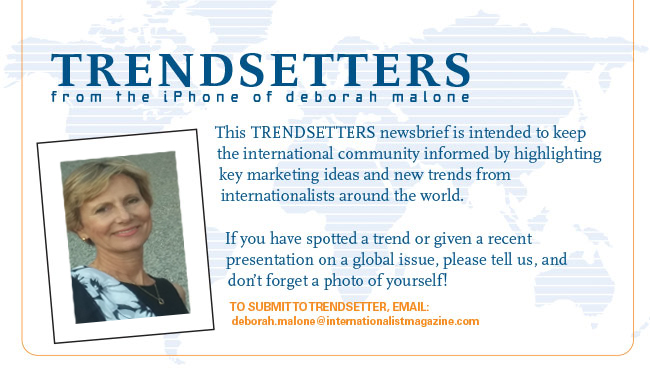

Ivan Pollard
See the current issue
of The Internationalist magazine
Find out how to sponsor an issue of Trendsetters
|
|
Trendsetters: Coca-Cola's Ivan Pollard Questions Digital Metrics and Asks if Micro-Moments Aggregate to Scale?
Ivan Pollard always makes you think. As a public speaker, he never fails to entertain, yet his insights often shine brightest when he asks us to consider a different vantage point when grappling with current reality.
At the WFA (World Federation of Advertisers) Global Marketer Summit in Toronto last month, he raised an important issue that may not be particularly popular in today's digital world. He asked a simple question of the audience: "What is worth more? A social media post or a sign post?"
For Ivan Pollard, the answer lies in understanding how to attract consumers' interest in an "attention deficit" age, while also recognizing that mass numbers and big scale still matter to large global brands and remain essential to the econometrics of Consumer Packaged Goods.
He says, "Marketers have been living with the promise of the digital world in delivering more effective and more efficient communications. But with the promises come problems." Through his own quest to figure out how modern marketers create positive outcomes, he believes that we now severely undervalue the "real world."
While he concedes that "digital is amazing," Ivan Pollard does not believe that digital changes everything. It instead changes the way we do things, so they are faster, cheaper, smarter and better. He argues that "Digital tools have the same intent as traditional ones," and marketing still requires non-digital elements like brilliant strategy, great ideas and memorable creative.
So, he ponders if today's micro-segmenting and precision targeting can add up to something big? He asks, "Will these elements build brands in the long term?" More importantly, Ivan Pollard reminds us that a one-to-one experience is not the same as a collective experience that can define the cultural zeitgeist. He uses the example of Coca-Cola's famous "hilltop" ad from the 1970's that featured, I'd Like to Teach the World to Sing. In many ways, it was a global cultural moment that is still remembered. Although it arrived in a pre-digital era, few can deny its real-world impact.
Yet, he recognizes that in today's world, being everywhere, all the time, is impossible. As a result, Coke ties closely with Christmas and Fanta links with Halloween to continue the conversations that matter to those brands at decisive moments. He sees this as the contemporary trade-off between ubiquity and presence.
So what does this mean in media terms? "Good moments," says Pollard, "are okay to pay for. But decisive moments are really worth paying for. They don't happen all the time, so they're certainly worth a premium." He also argues, that for mass brands, those people who are outside of a desired audience are not worthless, but in terms of media economics, they're simple worth less and still have value.
For Ivan Pollard, the quality of the content is the key to great advertising. So, what does this mean about his original question: "What is worth more? A social media post or a sign post?"
"The real world should not be forgotten, and there should be a balance between the real world and the digital world. It's not either/or, but the right version of and. As marketers, we should fix the balance by focusing on the 'investment' part of ROI, and pay appropriately for what each of these worlds provides."
Quite simply, Ivan Pollard believes that we need different tools to sell different products, and he acknowledges that massive scale is at the core of Coca-Cola. "The biggest problem," he says, "is forgetting that what we do. As marketers, we should understand what human beings want. Listen to what they want us to make, and we should make it. We make 500 drinks around the world—not just Coca-Cola."
Ivan Pollard joined The Coca-Cola Company in January 2011 as Vice President, Global Connections. In December 2015, he became SVP, Strategic Marketing for Coca-Cola North America. Prior to joining The Coca-Coca Company, Ivan was a Global Partner in Naked Communications, the world's largest connections planning company. He brings with him 25 years of working in communications planning in agencies such as BMP, DDB, Needham and Wieden+Kennedy. He opened his own company in the late nineties, Unity, the first independent strategic connections planning agency in London. Ivan has a BSc in Physics from Nottingham University, and really does ride a unicycle.
